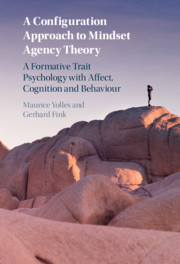 A Configuration Approach to Mindset Agency Theory
A Configuration Approach to Mindset Agency Theory Book contents
- A Configuration Approach to Mindset Agency Theory
- A Configuration Approach to Mindset Agency Theory
- Copyright page
- Contents
- Figures
- Tables
- Foreword
- Introduction
- Part I Cybernetic Sociopsychology and Agency
- Chapter 1 Mindset Agency Theory – an Underview
- Chapter 2 An Exercise in Configuration
- Chapter 3 Mindscapes Theory and Balanced Personality
- Chapter 4 Normative Personalities
- Chapter 5 Understanding Formative Traits and Behaviour
- Summarising Narrative for Part I
- Part II From Cognition to Affect
- Part III Modelling Identity Types through Agency
- Part IV Formal Possibilities in Mindset Agency Theory
- Part V Conclusion
- Book part
- Notes
- Glossary
- References
- Index
Chapter 4 - Normative Personalities
from Part I - Cybernetic Sociopsychology and Agency
Published online by Cambridge University Press: 28 July 2021
- A Configuration Approach to Mindset Agency Theory
- A Configuration Approach to Mindset Agency Theory
- Copyright page
- Contents
- Figures
- Tables
- Foreword
- Introduction
- Part I Cybernetic Sociopsychology and Agency
- Chapter 1 Mindset Agency Theory – an Underview
- Chapter 2 An Exercise in Configuration
- Chapter 3 Mindscapes Theory and Balanced Personality
- Chapter 4 Normative Personalities
- Chapter 5 Understanding Formative Traits and Behaviour
- Summarising Narrative for Part I
- Part II From Cognition to Affect
- Part III Modelling Identity Types through Agency
- Part IV Formal Possibilities in Mindset Agency Theory
- Part V Conclusion
- Book part
- Notes
- Glossary
- References
- Index
Summary
In this chapter a cybernetic psychosocial view will be adopted to theoretically explore plural agencies (defined through their population of agents) with a common culture, a collective mind, and behaviour. Within the context of cognitive information process theory, the collective mind is an information system that operates through a set of logical mental rules and strategies (e.g., Atkinson & Shiffrin, 1968; Bowlby, 1980; Novak, 1993; Wang, 2007). This has relevance to cognitive learning theory (e.g., Miller & Dollard, 1941; Miller et al., 1960; Piaget, 1950; Vygotsky, 1978; Argyris & Schön, 1978; Bandura, 1986, 1988; Nobre, 2003; Argote & Todorova, 2007), where ‘learning is seen in terms of the acquisition or reorganisation of the cognitive structures through which humans process and store information’ (Good & Brophy, 1990: 187).
- Type
- Chapter
- Information
- A Configuration Approach to Mindset Agency TheoryA Formative Trait Psychology with Affect, Cognition and Behaviour, pp. 134 - 161Publisher: Cambridge University PressPrint publication year: 2021
